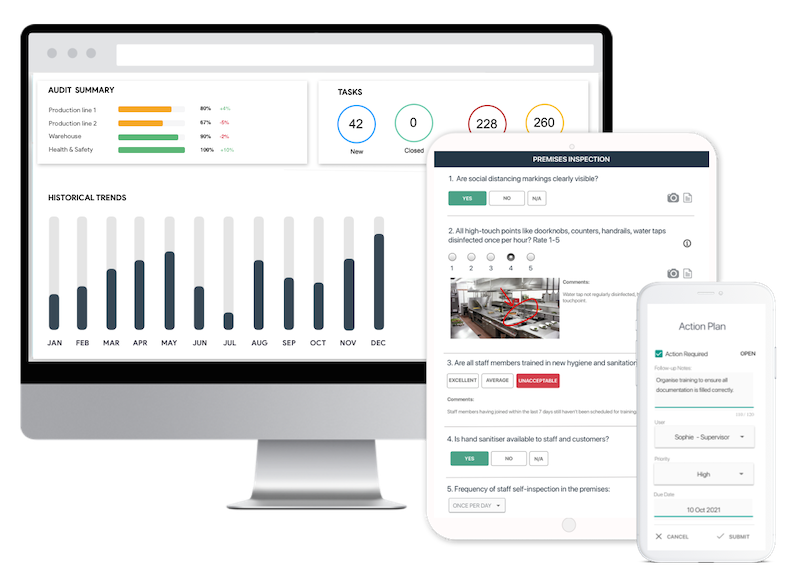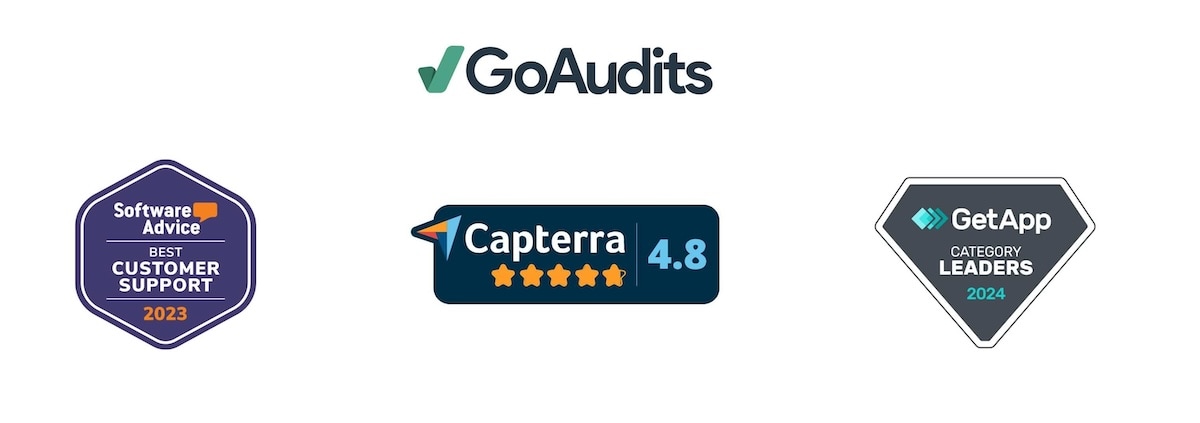Risk assessment is an essential process in ensuring workplace safety, but it often comes with significant challenges. One common issue is the difficulty in systematically gathering complete and accurate data, which is essential for identifying potential hazards effectively. Additionally, the dynamic nature of workplaces means that risks can change rapidly, making it hard for traditional risk assessments to keep pace. Miscommunication and inconsistent evaluations across different departments can further complicate the process, leading to overlooked or misjudged risks.
Risk assessment apps and software can address many of these challenges by streamlining data collection, enabling real-time updates, and improving collaboration across teams. Online risk assessment tools ensure that risk assessments are not only more accurate but also more adaptable to the changing conditions of modern workplaces.
This blog will explore the 5 best risk assessment software, their key features and benefits, and factors to consider to choose the one that works for your organization.
What are Risk Assessment Apps?
Risk assessment apps or software are designed to identify, evaluate, and mitigate potential risks in various organizational processes. They streamline the complex task of risk assessment by providing structured frameworks and automated features, making it easier for businesses to maintain compliance, protect assets, and ensure safety. They also help organizations monitor and review the effectiveness of risk management strategies and update them as necessary.
At their core, risk assessment apps help analyze potential threats to an organization by examining various factors such as security vulnerabilities, operational inefficiencies, and compliance gaps. Online risk assessment software assesses the likelihood and potential impact of these risks, allowing organizations to prioritize their responses. By automating data collection, analysis, and reporting, they enhance the accuracy and efficiency of risk assessments, enabling organizations to make informed decisions quickly.
Top 5 Best Risk Assessment Apps & Software in 2025
Let’s compare the 5 best risk assessment apps and software, with their key features and highlights.
1. GoAudits
GoAudits is a comprehensive auditing and inspection app designed to streamline and enhance the efficiency of audit processes, including risk assessments. GoAudits mobile risk assessment app allows users to conduct inspections on the go, even offline. Tailored for sectors such as hospitality, food and beverage, retail, healthcare, manufacturing, construction, and logistics, the GoAudits safety inspection app & software can help you ensure accuracy, compliance, and security.

Key Features and highlights of GoAudits:
- Conduct risk assessments up to 5 times faster using customizable digital checklists with photos, annotations, and e-signatures.
- It works even offline on all devices, including phones, tablets, and computers.
- Automatically generate insightful, branded reports after every risk assessment.
- View smart scores, recurring failures, and historical trends.
- Set up automated report distribution and assign responsibilities.
- Assign follow-up actions to the appropriate personnel. Set up workflows to send reports, reminders, and escalations.
- Use smart dashboards to track performance and trends. Compare performance across sites or teams and drill down into details.
- Make informed decisions to improve business operations by spotting trends and resolving recurring issues.
- It enhances communication between frontline teams and management, ensuring everyone is aligned on tasks and responsibilities.
- GoAudits mobile risk assessment app is available in six different languages.

2. Sphera
Sphera offers risk assessment software designed to integrate and manage various aspects of enterprise risk. It provides full visibility into operational and corporate risks, facilitating a comprehensive understanding of potential hazards. It is tailored to meet the needs of diverse industries by combining advanced analytics with customizable workflows.
Key Features and Highlights of Sphera:
- It centralizes risk data, providing a unified view of risks across the enterprise.
- It supports various risk assessment methodologies, including Failure Modes and Effects Analysis (FMEA), Process Hazard Analysis (PHA), Layer of Protection Analysis (LOPA), Hazard and Operability Study (HAZOP), and Security Vulnerability Assessment (SVA).
- It provides real-time data visualization and reporting capabilities, including risk dashboards, performance metrics, exportable reports, etc.
- It can integrate with other Sphera modules, such as Environmental, Health, Safety & Sustainability (EHS&S) and Operational Risk Management.
- It supports mobile devices, allowing for on-the-go risk assessment and reporting.
3. EcoOnline
EcoOnline is comprehensive risk assessment software designed to streamline and standardize risk management processes across various industries. It provides a centralized platform that enhances visibility, compliance, and efficiency, making it easier for organizations to manage health and safety risks.
Key Features and Highlights of EcoOnline:
- It allows for the creation, sharing, and editing of risk assessments and templates.
- Users can create specific risk assessments based on particular tasks, which helps in tailoring safety measures to different work scenarios.
- It includes automated review date reminders and version control.
- It features dashboards that provide insights into risk trends and data visualization tools that convert complex data into easily understandable graphs and charts.
- It enables the assignment of risk-related actions to specific individuals.
- With a mobile-friendly interface, it allows for on-the-go assessments and incident reporting.
- It offers comprehensive document management capabilities, including the ability to attach supporting documents and maintain an organized repository of all safety-related documents.
- It provides a variety of templates and customizable workflows.
- It supports real-time data collection and reporting, enabling managers to access up-to-date information on risk assessments and compliance metrics.
4. OiRA
OiRA (Online interactive Risk Assessment) is a free, online risk assessment tool developed by EU-OSHA to assist micro and small enterprises in conducting risk assessments. This web-based risk assessment tool provides a straightforward, step-by-step process to identify, evaluate, and manage workplace risks.
Key Features and Highlights of OiRA:
- Free and available online, with a mobile app.
- Tools are tailored to specific sectors and can be adapted to the company’s needs.
- Includes preparation, identification, evaluation, action planning, and reporting.
- Developed in collaboration with sectoral social partners and national authorities.
- Helps reduce costs associated with occupational illnesses and accidents.
- Simple and intuitive design, making it accessible even for small businesses with limited resources.
- Improves workplace safety and compliance, contributing to better working conditions and organizational performance.
5. Risk Assessor
Risk Assessor, developed by Safety Apps Ltd, is a comprehensive risk assessment software designed to streamline the creation and management of safety reports. It is accessible via mobile devices and computers, offering flexibility for users to work online or offline. It includes modules for risk assessments, method statements, incident reporting, and audits, all integrated with real-time data analytics.
Key Features and Highlights of Risk Assessor:
- It’s available on phones, tablets, and desktops, allowing work to be done anywhere.
- It includes tools for creating risk assessments, method statements, and incident reports.
- It provides live safety data and analytics.
- Users can tailor templates to fit specific industry needs.
- It allows users to work without an internet connection.
- It offers custom development of additional features or standalone apps tailored to specific business requirements.
- It streamlines safety documentation processes.
- It helps ensure compliance with safety regulations by providing standardized and customizable templates.
- It uses collected data to identify high-risk areas and improve safety measures.
FREE & Customizable Risk Assessment Checklists
Sign up for free and start using these risk assessment checklists.
- Monthly Manufacturing Risk Assessment Checklist
- Risk Management Checklist Template
- DSEAR Risk Assessment Checklist
- Microbiological Risk Assessment
- IT Risk Assessment Checklist
- Construction Site Risk Assessment Checklist
- Risk Assessment Template for Schools
- Chemical Risk Assessment Template
- ISO 31000 Risk Management Checklist
- Internal Audit Risk Assessment Checklist
- Office Hazards Checklist
- Manual Handling Risk Assessment Checklist
- Working at Height Risk Assessment Checklist
- Electrical Risk Assessment Checklist
What are the Benefits of Risk Assessment Apps?
Here are some key advantages of using risk assessment apps and software:
- Risk assessment apps allow organizations to detect potential threats early, assess their severity, and implement preventive measures before they escalate into significant issues.
- Online risk assessment tools automate many manual tasks associated with risk management, such as data collection, risk scoring, and reporting.
- Compliance risk assessment software helps organizations maintain compliance with relevant regulations and standards by providing timely alerts about outdated controls or new business risks.
- A risk assessment app helps organizations reduce the likelihood of costly incidents, such as workplace accidents, etc.
- Risk assessment apps provide detailed dashboards and reports that offer real-time insights, enable stakeholders to monitor risk levels, track the effectiveness of mitigation measures, and make informed decisions.
- Online risk assessment software apps often include user-friendly interfaces and mobile accessibility, making it easier for employees to report risks and hazards.
How to Choose the Best Risk Assessment App?
Choosing the best risk assessment app or software for your business involves several critical considerations to ensure that it meets your organization’s unique needs. Let’s help you make an informed decision:
- Understand Your Business and Industry Requirements
Before selecting a risk assessment app, it’s essential to understand the specific needs of your industry. Different sectors, such as finance, healthcare, and manufacturing, have distinct regulatory requirements and risk profiles. Identify the types of risks your business commonly faces, such as operational or compliance risks. A thorough understanding will help you choose the best risk assessment software tailored to your industry.
- Cost, Budget, and ROI
Cost considerations go beyond the initial purchase price. Evaluate the total cost of ownership, including implementation, training, maintenance, and potential upgrades. Consider the return on investment (ROI) by assessing how the risk assessment app can improve efficiency, reduce risks, and support compliance efforts.
- User-Friendly Interface
A user-friendly interface with intuitive navigation ensures that all stakeholders, regardless of technical proficiency, can effectively use the risk assessment app. Look for an online risk assessment tool with customizable dashboards, clear visualizations, and straightforward reporting capabilities to minimize training time and enhance productivity.
- Customer Support and Training
Choose a vendor that offers robust support, including tutorials, documentation, and access to a responsive customer service team. Training resources such as online courses, and user manuals can significantly ease the onboarding process, ensuring your team can quickly become proficient with the risk assessment app.
- Data Security
Ensure that the risk assessment management software provides strong encryption, secure access controls, and compliance with data protection standards like GDPR or SOC 2. Evaluate the vendor’s data security certifications and history of managing sensitive information.
- Compliance with Regulatory Standards
Compliance risk management software should facilitate compliance management by offering tools to monitor regulatory changes, generate compliance reports, and maintain audit trails. It should support compliance with standards such as ISO: 45001, etc., depending on your industry requirements.
- Free Trials and Personalized Demos
Most vendors offer free trials or personalized demos, which are invaluable for evaluating which one is the best risk analysis software for your organization. They allow you to test the functionality, interface, and performance in a real-world context. Use this opportunity to involve key stakeholders in the evaluation process and gather feedback on its usability and features.
- Essential Features
An effective risk assessment app should include key features such as:
- Risk assessment tools for identifying, assessing, and documenting risks.
- Predefined and customizable inspection checklists for thorough risk assessments.
- Support for mobile devices, enabling field assessments and access from anywhere.
- Ability to function without an internet connection, ensuring continuity in remote areas.
- Real-time tracking and updates on risk status and mitigation efforts.
- Tools to manage and document corrective and preventive actions (CAPA) processes.
- Automated task assignments and workflow management to streamline processes.
- Quick generation of comprehensive reports for stakeholders.
Are you still performing risk assessments the traditional way? If yes, your risk assessments are prone to manual errors, time-consuming paperwork, and inconsistent reporting.
TRY GoAudits Risk Assessment App & Software for FREE to streamline your risk assessments.
Share this article


